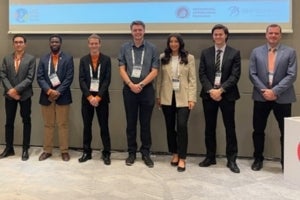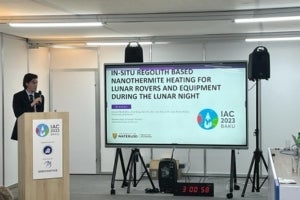A cross-disciplinary team from Waterloo were awarded second prize in an international competition organized by SPACE Canada. The group received recognition for work focusing on the use of lunar resources to build infrastructure for space-based solar power.
Since 2016 the International Space Solar Power Student Project Competition has sought out the best in student research in the field of space solar power. The competition serves as a platform for a new generation of scientists and engineers who are passionate about renewable energy and the potential of space-based solar power. This year, the competition received entries from universities in over 17 countries, with 11 teams being invited to a semi-final at the International Space Development Conference held in Dallas-Frisco, Texas. The top four teams then advanced to the final, held at the 74th International Astronautical Congress, in Baku, Azerbaijan.
The Waterloo team who presented their work in Baku was made up undergraduate and graduate students supported by faculty advisors. Connor MacRobbie (MASc. candidate, mechanical engineering), Kyle MacRobbie (BSc. candidate, physics and astronomy), Jack Ehling (BSc. candidate, physics and astronomy), Dr. Anqi Wang (Post-doctoral Fellow), Dr. John Wen (Professor, mechanical and mechatronics engineering), and Dr. Jean-Pierre Hickey (Associate Professor, mechanical and mechatronics engineering) leveraged their diverse expertise to tackle a uniquely complex challenge.
The paper developed by the Waterloo group addresses a growing area of lunar research. To reduce the volume of materials that need to be transported to the moon in future missions it has been proposed that locally found raw materials be extracted, refined and used for energy, life support and construction. The emerging fields of In-Situ Resource Processing and In-Situ Resource Utilisation are essential to the future exploration and development of the moon. Lunar resource processing requires huge amounts of power, and solar energy (provided by orbiting satellites) can be used to meet this need. Waterloo researchers examined several established proposals for using solar power to convert lunar topsoil into useable material. The team also proposed a novel processing method that has the potential to both reduce costs and increase the purity of the end product. The paper concluded by outlining the potential of in-situ resource processing and utilisation to provide materials for maintaining and developing solar power systems.
To cap off a successful trip to Baku the research group led a special technical session which featured a discussion on the potential uses of regolith, the term given to upper layers of dirt and rock found on the lunar surface and mars. This idea sharing platform and the success of the research group’s competition paper highlight the growing contribution of Waterloo based researchers to sustainable space exploration. Reflecting on the experience Connor MacRobbie emphasised the strengths of the Waterloo team and the value of research they presented. “This project has been an amazing opportunity to work with a great group on the important problem of space sustainability and how it connects with space solar power technology.”
Go to the Emerging Energy Research Laboratory for more on the work being done at Waterloo.

The Waterloo team received second place in the international competition

Waterloo student Connor MacRobbie presents at International Astronautical Congress (IAC)